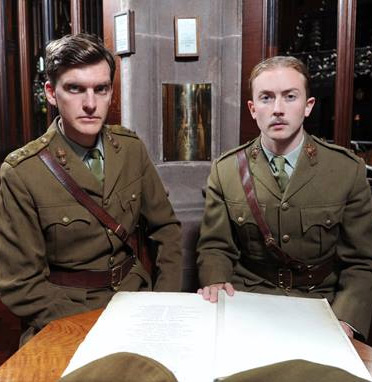Not About Heroes (Trafalgar Studios)
Stephen MacDonald’s play centres on the friendship between war poets Siegfried Sassoon and Wilfred Owen

As Armistice Day drew to a close, the body of the brilliant young war poet Wilfred Owen was draped in a red blanket. Everyone in the smaller of the Trafalgar Studios must have thought of the larger, more spectacular red blanket of ceramic poppies surrounding the Tower of London.
Owen himself, who died aged 25 in an early morning attack on a French canal just one week before the end of the original Armistice Day in 1918, said he wrote not about heroes, but the pity of war.
"What passing bells for these who die as cattle? Only the monstrous anger of the guns. Only the stuttering rifles' rapid rattle can patter out their hasty orisons." In Stephen MacDonald's neat and nifty play, we see the senior poet, Siegfried Sassoon, supervising Owen's final version of this verse, "Anthem for Doomed Youth."
The poet soldiers met in the Craiglockhart War Hospital for Nervous Disorders in Edinburgh in August 1917, the setting, too, for Nicholas Wright's centenary play this year, Regeneration. MacDonald's two-hander dates from 1982 and has been seen regularly all over the country ever since.
Caroline Clegg's stark, unsentimental production completes a long tour at the Trafalgar, and the performances of Alasdair Craig as Sassoon, whom the authorities had "hospitalised" for his bolshie outburst of pacifism, and Simon Jenkins as Owen, convalescing from shell-shock, remain fresh and spontaneous.
Owen's hero worship transmutes into a willing apprenticeship (in which the master realises he has more to learn from the student) and something like love. Sassoon recalls the events in his country house in 1932; Owen, on the cusp of a literary breakthrough, writes home excitedly to his mother about his poems and meetings with great men.
The play never quite clinches this historical pincer movement, but Sassoon's phlegmatic authority creates the necessary abrasion of incident and memory. And Owen's eager youthfulness is well caught, if a little too prissily, by Jenkins in his well-pressed uniform, perfectly graduated haircut, popping eyes and little moustache.
After a year in Britain, in which he met all the greats – Robert Graves, Robert Ross, H G Wells and Arnold Bennett – Owen realised he had to return to the front line, not for his country, but for his art. His tragic impetuosity resonates still, and MacDonald's play, with its swift summary of a momentous period, flecked with the poetry of Keats and Shelley as well as of Owen and Sassoon, is a small gem.
Not About Heroes continues at Trafalgar Studios 2 until 6 December 2014












